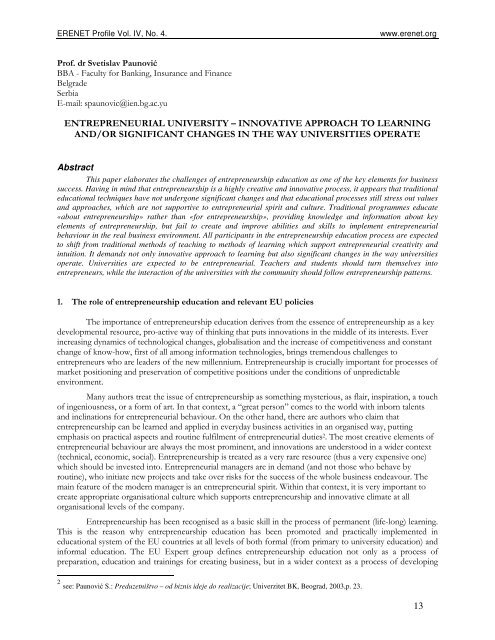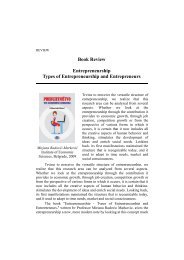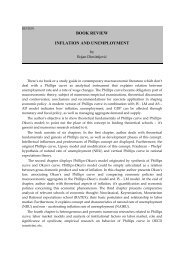Issue 16
Issue 16
Issue 16
Create successful ePaper yourself
Turn your PDF publications into a flip-book with our unique Google optimized e-Paper software.
ERENET Profile Vol. IV, No. 4.<br />
www.erenet.org<br />
Prof. dr Svetislav Paunović<br />
BBA - Faculty for Banking, Insurance and Finance<br />
Belgrade<br />
Serbia<br />
E-mail: spaunovic@ien.bg.ac.yu<br />
ENTREPRENEURIAL UNIVERSITY – INNOVATIVE APPROACH TO LEARNING<br />
AND/OR SIGNIFICANT CHANGES IN THE WAY UNIVERSITIES OPERATE<br />
Abstract<br />
This paper elaborates the challenges of entrepreneurship education as one of the key elements for business<br />
success. Having in mind that entrepreneurship is a highly creative and innovative process, it appears that traditional<br />
educational techniques have not undergone significant changes and that educational processes still stress out values<br />
and approaches, which are not supportive to entrepreneurial spirit and culture. Traditional programmes educate<br />
«about entrepreneurship» rather than «for entrepreneurship», providing knowledge and information about key<br />
elements of entrepreneurship, but fail to create and improve abilities and skills to implement entrepreneurial<br />
behaviour in the real business environment. All participants in the entrepreneurship education process are expected<br />
to shift from traditional methods of teaching to methods of learning which support entrepreneurial creativity and<br />
intuition. It demands not only innovative approach to learning but also significant changes in the way universities<br />
operate. Universities are expected to be entrepreneurial. Teachers and students should turn themselves into<br />
entrepreneurs, while the interaction of the universities with the community should follow entrepreneurship patterns.<br />
1. The role of entrepreneurship education and relevant EU policies<br />
The importance of entrepreneurship education derives from the essence of entrepreneurship as a key<br />
developmental resource, pro-active way of thinking that puts innovations in the middle of its interests. Ever<br />
increasing dynamics of technological changes, globalisation and the increase of competitiveness and constant<br />
change of know-how, first of all among information technologies, brings tremendous challenges to<br />
entrepreneurs who are leaders of the new millennium. Entrepreneurship is crucially important for processes of<br />
market positioning and preservation of competitive positions under the conditions of unpredictable<br />
environment.<br />
Many authors treat the issue of entrepreneurship as something mysterious, as flair, inspiration, a touch<br />
of ingeniousness, or a form of art. In that context, a “great person” comes to the world with inborn talents<br />
and inclinations for entrepreneurial behaviour. On the other hand, there are authors who claim that<br />
entrepreneurship can be learned and applied in everyday business activities in an organised way, putting<br />
emphasis on practical aspects and routine fulfilment of entrepreneurial duties 2 . The most creative elements of<br />
entrepreneurial behaviour are always the most prominent, and innovations are understood in a wider context<br />
(technical, economic, social). Entrepreneurship is treated as a very rare resource (thus a very expensive one)<br />
which should be invested into. Entrepreneurial managers are in demand (and not those who behave by<br />
routine), who initiate new projects and take over risks for the success of the whole business endeavour. The<br />
main feature of the modern manager is an entrepreneurial spirit. Within that context, it is very important to<br />
create appropriate organisational culture which supports entrepreneurship and innovative climate at all<br />
organisational levels of the company.<br />
Entrepreneurship has been recognised as a basic skill in the process of permanent (life-long) learning.<br />
This is the reason why entrepreneurship education has been promoted and practically implemented in<br />
educational system of the EU countries at all levels of both formal (from primary to university education) and<br />
informal education. The EU Expert group defines entrepreneurship education not only as a process of<br />
preparation, education and trainings for creating business, but in a wider context as a process of developing<br />
2 see: Paunović S.: Preduzetništvo – od biznis ideje do realizacije; Univerzitet BK, Beograd, 2003,p. 23.<br />
13
















